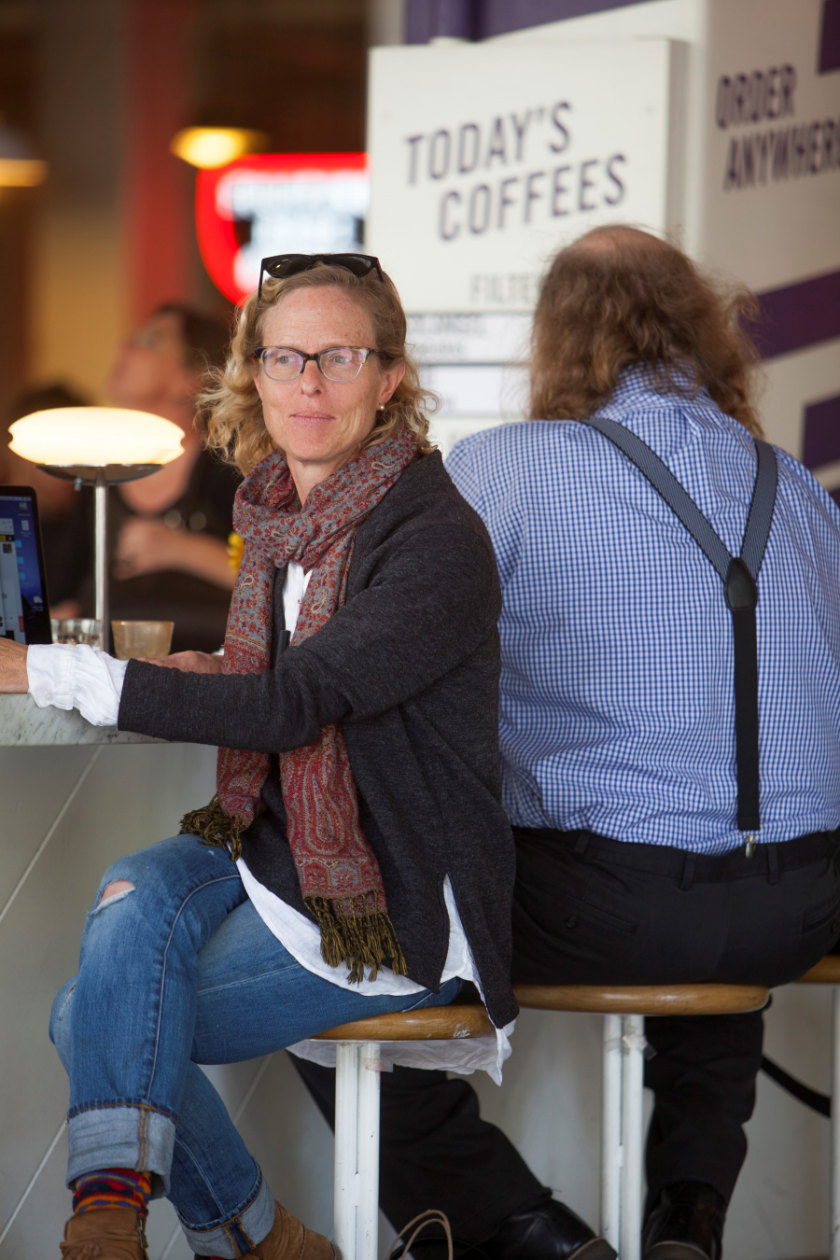
LIVING Los Angeles Times’ food editor Amy Scattergood meets with Elyse Glickman to discuss why food festivals need to evolve to provide everybody a seat at the table
Elyse Glickman is US west coast editor of Lucire.
The public has embraced chefs as the “new rock stars” for over a decade. And if that’s the case, food festivals can be likened to the Lollapolooza- and Coachella-type outings that put the spotlight on how chefs and restaurateurs strut their stuff and present their greatest hits. And just like those massive music festivals, these once-revolutionary events have settled comfortably into establishment status. Fans gladly spend good money on tickets to see, hear and be seen as they would with high-profile music events, but also use their other senses of smell and taste.
A prime example of this is the always-fun Labor Day Weekend tradition that is The Taste at Paramount Studios, produced by the Los Angeles Times, and covered by outlets in many other places (including Lucire). It has what any good rock festival has—celebrity, colour, fancy stage sets, and lots of buzz of what’s hot—and cool.
And as much as the paper’s food editor Amy Scattergood loves a good festival, she says there’s room for another kind of festival built from events that invites everybody to the party that enlighten as much as they satisfy.
‘Right now, we’re sitting two blocks from Skid Row, and Los Angeles has an exploding homelessness programme, and with it a hunger problem,’ Scattergood points out. ‘What bothers me about some fancy food events is that they are by definition, élitist. They, along with chef dinners at some fancy restaurants, are promoted towards the people who have the extra $100 or $400 disposable income to spend.’
Scattergood then clarifies that in the beginning, food festivals have focused on the back end, or final dish people will queue up to sample. Like a fine restaurant’s open-concept kitchen, you go in, enjoy the fancy food, and see the chef and his team in action. However, the festivals don’t often chronicle what happens behind the closed kitchen doors, especially in terms of what is wasted, where a restaurant gets its food, what the costs of making the meal are, and how are those costs passed on to the consumer.
With the Los Angeles Times Food Bowl, happening throughout the month of May and locations throughout the city, she affirms the goal is to make people more aware about what’s happening in the food chain, and provide access to high-profile people talking about everything from celery stems to addressing hunger in the city or around the world in a practical way to potentially change the way people look at food as well as prepare it and eat it.
‘We wanted to see how big and inclusive we could make it,’ she says. ‘And democratic. While élites enjoy foods that are carefully plated, the rest of us have our food served in bowls. If the goal is to expand the conversation about food sustainability, and conservation, we don’t need an excuse to charge a lot of money and sell a lot of tickets.’
In its second year, headliners include Diana Kennedy, a 94-year-old culinary legend and subject of the documentary Nothing Fancy, to talk about the cuisines of Mexico. If you want somebody like her to headline an event, and also have meaningful encounters with José Andrés (Changing the World through the Power of Food), Susan Feniger and Mary Sue Milliken (Gold Award recipients), Daniel Humm, up-and-coming Peruvian star chef Virgilio Martínez, you will need more than 12 hours over the course of a weekend.
One could describe the format as an ultimate progressive dinner combined with a buffet where individuals can pick and choose what they want to consume. There are high-priced ticket events such as the festival’s launch party and private dinners on one end of the spectrum. On the other, there are several free and open-to-the public events like bake sales, demonstrations, and exhibitions, as well as other events with samples, meet-and-greets, and samples for as little as US$10, US$15, or US$25.
Given Los Angeles’ notoriously bad traffic, having unique events in different parts of the city, from Sustainable Seafood in Manhattan Beach or a meat-centric Beast Feast in Hollywood headlined by Australian chef Curtis Stone, to various events in the city’s ethnic neighbourhoods adds dimension to Scattergood’s definition of accessibility.
One of the guides on this ultimate food tour is Jonathan Gold, the city’s leading food critic, who landed on the national and international culinary map by opening his readers up to the treasures found in Mom and Pop diners, street food spots, and food trucks. Scattergood, who is Gold’s editor at the Times, says he perfectly embodies the festival’s goals and as a host for several events, provides the perfect thread of continuity that winds through it.
‘When we lost Michelin a few years ago, we had a reputation for not being a fine-dining town, which is ridiculous when you consider how we’re home to some of the best restaurants and most innovative chefs in the country,’ says Scattergood. ‘But for one thing, we’ve got Pulitzer Prize-winning journalist Jonathan Gold, who is best known for writing about street food—but he also has been to and reviewed some of the city’s and the world’s best restaurants. He is truly a representation of democracy, especially with his accessibility. He became the national figure he is now because of the way Los Angeles has shaped him. He drives around LA in a pick-up truck with 250,000 miles, yet is symbolic of what makes Los Angeles one of the most distinctive dining towns in America.’
She also cites José Andrés as a personification of the festival’s goals. While he owns white-tablecloth restaurants around the globe, he is also just as well known for his work in disaster relief, which will be an integral part of this presentation.
‘To have him come here and talk about his involvement on both ends of the food spectrum makes for insight that’s invaluable,’ she says. ‘He not only wants people to think about where the parsley on one’s plate is from but also how much it costs to get it to one’s plate, how much is used, how much is thrown away, and why it’s significant that many people out there are not able to get fresh parsley.’
Then there’s the matter of philanthropy, which is another required element of food festivals. However, Scattergood says that events at all price points in this festival are not only supporting various food-related causes financially, but are literally putting their money where their mouths are. She adds the money goes direct to the organizations that feed the homeless, as opposed to other festivals handing out a random token amount handed out for exposure and good PR.
‘One of the reasons why José Andrés is coming is because he co-founded LA Kitchen, and walks the walk in his own kitchen,’ she says. ‘What we’re trying to do through the month-long format is to not only focus on innovative restaurants at different price points, but also the farmers’ markets and food kitchens helping the poor. We have food bank representatives at the events, which not only allows attendees to feel good about the money they are spending in the immediate, but also learn more about other things they can do to be a part of the solution with the food bank. Learning, for example, about how your kids can volunteer on a Saturday to help out at the food bank.’
Scattergood also affirms that from a pragmatic standpoint, with LA dealing with drought and the effects of global warming and the city’s homelessness problem, the events in one way or another are engineered to encourage attendees to participate in a meaningful way: to not just come to the events, but to take the spirit of them home, translate the knowledge, and apply it to daily life.
‘Tokenism only goes so far,’ she says. ‘It feels good to show the public what these chefs are doing in their own kitchen to improve things on a sustainability front. As I see it, we’re opening the curtain so people can see it’s not just for hype or a photo op. What we want people to understand is how low profit margins are at restaurants, with the minimum wage and other expenses going up, and the cost of living rising which, in turn, cause restaurants to open and close in a shorter period of time. These interactions make ordinary people connect to the causality and changes in the way they eat because the better understand the food chain they are a part of.’
Scattergood’s views and hopes for Food Bowl also stem from her own beginnings, which reflect the way many people in Los Angeles (and everywhere else) who are aware of food’s origins, sustainability, and related social issues think about the subject.
‘I grew up in a modest home where my mother made things like yoghurt from scratch,’ she says. ‘She did not do it because she was some kind of artisan or hipster. She did it because she had modest means, and it’s interesting to see how survival strategies and luxury come together. Seeing how to work it into one’s life gives people empowerment and control. Great ideas come from things that are originally done purely for practicality.’
When you think about it, blues, rock, and pop music arose from similar circumstances. And it is this mindset with which Scattergood and others behind Food Bowl will help food lovers of all stripes to get their fill of favourite dishes while providing some nourishing food for thought.
To learn more about the Los Angeles Food Bowl, its charitable tie-ins, and to view and sign up for various events, visit lafoodbowl.com. •
Related articles hand-picked by our editors

For the most exclusive kitchens
Lola Cristall is impressed by premium cookware and appliances from Anolon, Braun and De’Longhi, and we find the perfect £50,000 Modulnova kitchen for them

Three Olives, one Halsey, and countless ways to express yourself
Elyse Glickman heads to Coachella with Three Olives on its own psychedelic-liveried bus, with singer Halsey as VIP on the road trip
Photographed by the author
 Hands across the ocean
Hands across the ocean
Some celebrity philanthropists go public to clear the air on their causes. Actress Tanna Frederick, meanwhile, wants to clear the water, writes Elyse Glickman
Photographed by Philip Alderton and Odessy Barbu
From issue 35 of Lucire
Advertisement
Copyright ©1997–2022 by JY&A Media, part of Jack Yan & Associates. All rights reserved. JY&A terms and conditions and privacy policy apply to viewing this site. All prices in US dollars except where indicated. Contact us here.